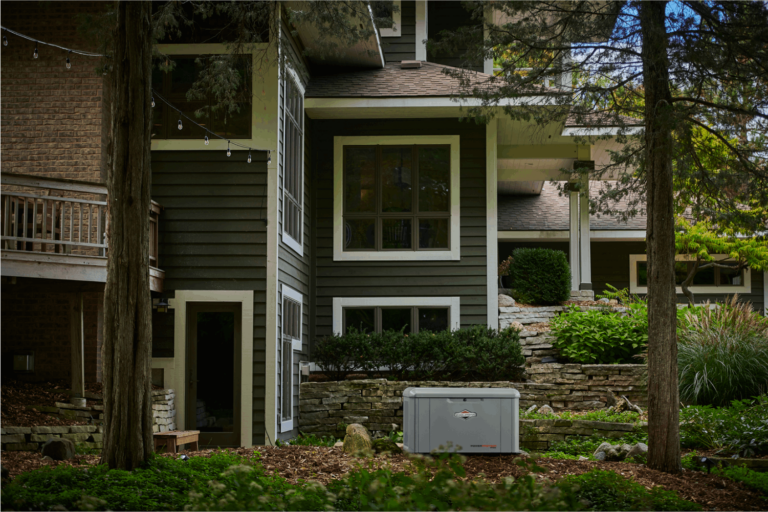Proudly Serving Fayetteville & Raleigh/Durham, NC

Lifesaving in-home medical equipment — such as oxygen machines and medication nebulizers — depend on a reliable power supply, which can be disrupted during a power outage.
Comfort First Heating & Cooling expertly installs whole-home generators for North Carolina homeowners to keep essential equipment and appliances running in an emergency.
Our highly trained, licensed, and insured technicians can calculate your home’s electrical load and provide a free estimate for a whole-home generator system that will give you peace of mind for years to come.
Schedule whole-home generator installation today when you call 919-635-4349.

Why Do I Need a Whole-Home Generator?
A whole-home generator is a powerful system that can alleviate many of the stressors North Carolina families experience during a power outage.
Here are a few reasons why homeowners find whole-home generators to be an invaluable investment during a power outage:
- You won’t need to connect and sustain a portable generator.
- You’ll be able to power medical equipment.
- Your home’s interior temperature will remain consistent for comfort and safety.
- Power surges won’t damage your devices and appliances.
- You’ll be able to charge mobile devices.
- Perishable groceries will stay fresh.
A standby generator will allow your home to continue like normal, even during an extended power outage, so you won’t have to disrupt your routines.
Request a free estimate for a whole-home generator installation by calling 919-635-4349 today.
Comfort First Proudly Installs & Services Briggs & Stratton Generators
Briggs & Stratton has over 100 years of experience manufacturing industry-leading whole-home generators, which Comfort First is proud to install for North Carolina homeowners.
These standby generator models come with a six-year limited warranty for mileage, labor, parts, and major components on top of Briggs & Stratton’s incredible 10-year warranty.
With a Briggs & Stratton whole-home generator, you can rest assured that you and your family can access essential devices and appliances during a power outage.
Comfort First also offers repair and maintenance for all generators we install.
Standby Generator Installation Process
Our team of professional technicians makes the generator installation process hassle-free from start to finish. Here’s what you can expect:
- Consultation and load calculation: We’ll arrive at your home to inspect your electrical system and discuss generator sizing, placement, and permit needs.
- Installation estimate: We’ll offer an accurate price estimate, including equipment and installation costs. We can also discuss financing options.
- Preparation and installation day: Installation generally takes one to two days — one to pour a concrete slab and the other to install the system. We’ll test your generator to ensure proper operation.
Looking for reliable whole-home generator installation in North Carolina? Call Comfort First at 919-635-4349 to schedule service.
Choose Comfort First for Standby Generator Installation in NC
If you need a trusted team to install a whole-home generator, Comfort First Heating & Cooling is ready to do the job.
We have over 50 years of experience serving homeowners across North Carolina and promise to respect you and your home by wearing shoe coverings inside and treating your property with care.
Call 919-635-4349 or contact us online today to request an estimate!
Frequently Asked Questions
Do I need to upgrade my electrical panel before I install a whole-home generator?
An electrical panel upgrade is the best option if you have a fuse box or your breaker panel is a few decades old.
However, most homeowners won’t need this service as modern electrical panels can support whole-home generators.
What are the differences between natural gas and propane home generators?
Propane-powered generators only operate as long as there’s fuel in your tank, so you’ll need to refuel intermittently.
Natural gas-powered generators use your home’s natural gas line to keep your generator running on its own until the power comes back on.
What are the differences between whole-home and portable generators?
With a whole-home generator, a transfer switch automatically senses when the power goes out and turns on your generator. You can also monitor your generator online or on your electrical panel instead of going outside in a storm.
Portable generators require manual setup and monitoring outdoors, including refueling and connecting extension cords from the generator to outlets inside.
What appliances can a generator power?
A whole-home generator is designed to power every appliance in your home, including furnaces, air conditioners, refrigerators, water heaters, sump pumps, and more.
The more appliances you run on a generator, the higher the wattage it will need to manage, so it’s important to determine how much wattage your home uses on a regular basis to size your generator accurately.
















